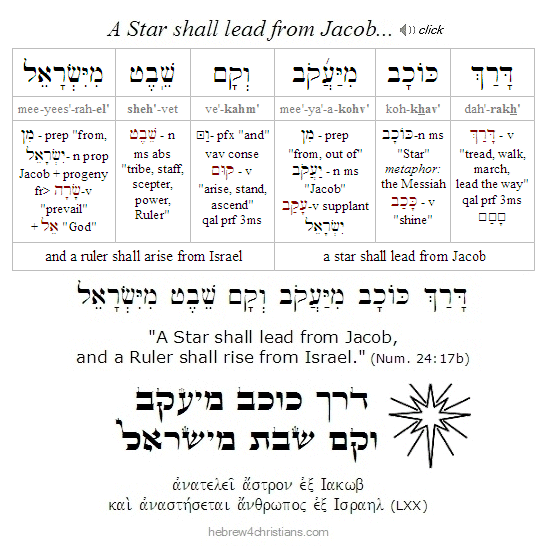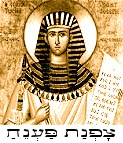|
In this week's Torah we read about Joseph's dramatic revelation of his identity to his long lost brothers. Recall that it was on account Judah's heartfelt intercession that Joseph was finally convinced that the brothers had undergone teshuvah (repentance) and therefore had truly changed. Spiritually speaking, these were not the same brothers who had thrown him into a pit years before.... Notice also that immediately after he revealed himself to the brothers Joseph asked about the welfare of his father Jacob: אֲנִי יוֹסֵף הַעוֹד אָבִי חָי / ani Yosef, ha'od avi chai / "I am Joseph; is my father alive?" Joseph's first concern was for his aged father, whom he had not seen since he was a teenage boy, some 22 years earlier.
The Torah states that Joseph was 17 years old when he was sold into slavery (Gen. 37:2). According to Jewish tradition, he was with Potiphar for a year and then thrown into prison for another 12 years. At age 30, therefore, the Pharaoh promoted Joseph to be governor of Egypt (Gen. 41:46). If he had been away from his father for a total of 22 years, that leaves nine years when he was governor of Egypt before he was reunited with his Jacob (Gen. 45:6). But why, then, did he allow his father to mourn for these extra nine years? After all, the land of Canaan was only a few days journey away, and Joseph certainly could have dispatched a messenger at any time with the news that he was alive. So why did Joseph continue to let his father mourn over his supposed death? If he was so concerned about the welfare of Jacob, why didn't he send word to his father that he was indeed alive?
To help explain this apparent inconsistency, the Jewish commentator Nachmanides (1194-1270) wrote that Joseph regarded his dreams as prophecies. In his first dream, his eleven brothers bowed down to him; in his second, his father was included too. Joseph concluded that the first dream must be realized in its entirety before the second one would be fulfilled. In other words, had he sent a message back home, Jacob certainly would have come to see Joseph immediately - but then the second dream would have come true before the first. Since he was a master of dream interpretation and understood the proper sequence of dreams, Joseph therefore waited until after all eleven of his brothers (including Benjamin) had come to him before he revealed his identity to his brothers and instructed them to bring his father down to Egypt.
Other Jewish sages say that Joseph was concerned that God would punish his brothers for selling him into slavery, and therefore he waited to ensure that they had genuinely repented. By definition, repentance (teshuvah) is demonstrated when the transgressor finds himself in the same situation as when he was tempted to sin in the first place, but this time chooses not to sin. Only after Joseph saw that their repentance was complete did he reveal himself and instruct the brothers to let his father Jacob know that he was still alive. Had Joseph let his father know earlier that he was still alive, his brothers would never have had the opportunity to undergo teshuvah. Notice further that according to Jewish tradition Joseph never told Jacob about his betrayal by his brothers -- not even when Jacob was on his deathbed. His love forbade him to engage in lashon hara (evil speaking) or to bring further pain to his father...
The revelation of Joseph and his reconciliation with his brothers is a prophetic picture of the acharit hayamim (end of days) when the Jewish people will come to understand that Yeshua is indeed the One seated at the right hand of the majesty on high as Israel's Deliverer. At that time Yeshua will speak comforting words to His long lost brothers and restore their place of blessing upon the earth.
The entire story of Joseph is rich in prophetic insight regarding Yeshua. Vayigash (וַיִּגַּשׁ) means "and he drew near," referring first to Judah's intercession for the sins of his brothers, and then to Joseph's reciprocal desire for the brothers to draw near to him (Gen. 44:18, 45:4). Joseph initiated the reconciliation by saying, גְּשׁוּ־נָא אֵלַי / g'shu na elai - "Please draw near to me," and indeed there is a play on the verb nagash (נָגַשׁ), "draw near," throughout this story. Yeshua is depicted in both Judah's intercession (as the greater Son of Judah who interceded on behalf of the sins of Israel) and in Joseph's revelation as the exalted Savior who draws the Jewish people back to Himself. When Joseph disclosed himself and asked, "Is my father alive," we hear Yeshua evoking the confession of faith from the Jewish people. Upon His coming revelation, all Israel will confess that indeed God the Father is "alive" and has vindicated the glory of His Son.
Hebrew Lesson
Numbers 24:17b reading (click):
 |
|



